What we need is a good war
I am tired of hearing about all the soft ways in which we can ‘stimulate the economy’ and ‘create jobs’ and reduce inflation. The fact of the matter is that government has comprehensively messed up every single industry that it can and is now looking at the broken pieces of the economy like a child who did not know that a broken mirror is very hard to repair. Even with glue.
A solution is suggested by the film The Mouse That Roared. I quote from Wikipedia : “The minuscule European Duchy of Grand Fenwick is bankrupted when an American company comes up with a cheaper imitation of Fenwick’s sole export, its fabled Pinot Grand Fenwick wine. Crafty Prime Minister Count devises a plan: Grand Fenwick will declare war on the US, then surrender, taking advantage of American largesse toward its defeated enemies to rebuild the defeated nation’s economy.”
Stay with me on this one. The following are facts: before World War II (which began in 1939, you Millennials) the technology situation was as follows – fighter aircraft were biplanes (double wings, like a Pitts acrobatic aircraft), radar was very crude, there were only very crude aircraft beam navigation systems, nobody had been treated with penicillin, there were no rocket missiles, no flying bombs, no nuclear devices, no computers . . . and no lots of other things. After World War II (which ended in 1945, you Ms), fighter aircraft were jet propelled, frequency skip plan position radar had been invented and, yes, so had all the other things. In six short years.
All this happened because the war demanded the supply of many things – from bayonets to battleships. The various governments found the money to buy these, and continue to buy them, since there is no market for a second-hand bullet or a used flying bomb. Thus, what is needed in this country is a new war that has huge material demands and which government has to find money to pay for. The brilliance of this idea lies in the fact that the contractors will have to supply real tangible material – not like so many government contracts, which are supposed to use labour to produce goods but, in fact, all they do is absorb money and produce nothing, not even a slab of butter or a litre of milk. Also, the new war will require technological advances of real worth. All those engineering design firms and manufacturing firms will need innovation so as to provide a whole range of products needed in a decent war.
There is the down side that wars generally cause pain, misery and death and suffering, often to innocent people and animals. It is important that this be avoided.
But, if we consider that current nationwide unemployment levels are about 28% and that the young are obsessed with games on smartphones, here is the plan to solve unemployment, fix the economy and get foreign investments. The young persons will be asked to participate in the war. Each participating young person will have to raise R1 000 to pay into a central fund. They will then be trained, placed in uniform and recruited into one of two armies, say the A-Army or the B-Army. At regular intervals, these two armies will fight it out in real time in the Kalahari desert with real weapons, bullets and stuff. All equipment will be provided by government.
At the end of two weeks, warfare survivors will split up the money in the fund. Government will use the real-time battle situation to evaluate its own weapons and those of other nations, for which it will charge a fee, which will finance the whole operation.
Money will pour in like a river. Fanciful? When I was younger, exactly this happened, with the difference that there was no fund to split up and we were ordered to participate, not asked. And it was two long years, not two weeks. What is there not to like?
Article Enquiry
Email Article
Save Article
Feedback
To advertise email advertising@creamermedia.co.za or click here
Comments
Press Office
Announcements
What's On
Subscribe to improve your user experience...
Option 1 (equivalent of R125 a month):
Receive a weekly copy of Creamer Media's Engineering News & Mining Weekly magazine
(print copy for those in South Africa and e-magazine for those outside of South Africa)
Receive daily email newsletters
Access to full search results
Access archive of magazine back copies
Access to Projects in Progress
Access to ONE Research Report of your choice in PDF format
Option 2 (equivalent of R375 a month):
All benefits from Option 1
PLUS
Access to Creamer Media's Research Channel Africa for ALL Research Reports, in PDF format, on various industrial and mining sectors
including Electricity; Water; Energy Transition; Hydrogen; Roads, Rail and Ports; Coal; Gold; Platinum; Battery Metals; etc.
Already a subscriber?
Forgotten your password?
Receive weekly copy of Creamer Media's Engineering News & Mining Weekly magazine (print copy for those in South Africa and e-magazine for those outside of South Africa)
➕
Recieve daily email newsletters
➕
Access to full search results
➕
Access archive of magazine back copies
➕
Access to Projects in Progress
➕
Access to ONE Research Report of your choice in PDF format
RESEARCH CHANNEL AFRICA
R4500 (equivalent of R375 a month)
SUBSCRIBEAll benefits from Option 1
➕
Access to Creamer Media's Research Channel Africa for ALL Research Reports on various industrial and mining sectors, in PDF format, including on:
Electricity
➕
Water
➕
Energy Transition
➕
Hydrogen
➕
Roads, Rail and Ports
➕
Coal
➕
Gold
➕
Platinum
➕
Battery Metals
➕
etc.
Receive all benefits from Option 1 or Option 2 delivered to numerous people at your company
➕
Multiple User names and Passwords for simultaneous log-ins
➕
Intranet integration access to all in your organisation


















